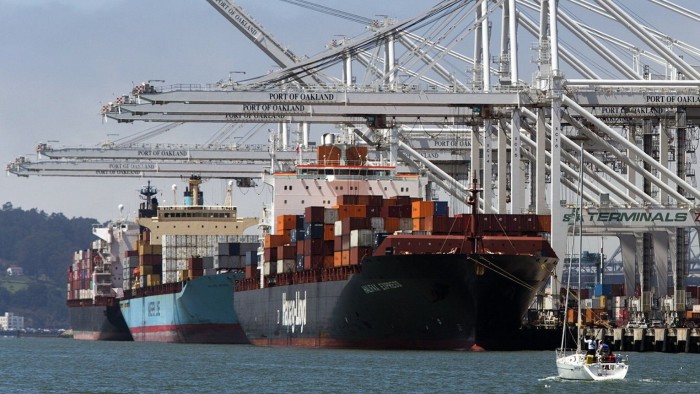Unlock the Editor’s Digest for free
Roula Khalaf, Editor of the FT, selects her favourite stories in this weekly newsletter.
Nearly $5bn has been wiped off the value of the biggest listed container shipping companies after a deal was reached to avert a strike at US ports that would have driven up prices.
The union representing about 45,000 dockworkers announced in a joint statement with employers on Wednesday that a “tentative agreement” had been agreed to prevent a shutdown that was planned to start next week.
Shares in the three largest publicly traded container shipping companies — Denmark’s AP Møller-Maersk, Germany’s Hapag-Lloyd and Taiwan’s Evergreen Marine — fell between 6 and 8 per cent on Thursday, wiping a total of $4.7bn off their market value.
Before Thursday, their collective market value had risen 7 per cent to $68.6bn since the beginning of September partly because of the prospect of industrial action.
US businesses had been preparing for a strike that would have affected three dozen ports from Maine to Texas, increasing congestion and costs.
A three-day strike at ports in October sent the average cost of shipping a 40ft container on short-term contracts between northern Europe and the US east coast up 31 per cent to $3,093, according to data provider Xeneta.
That strike was suspended after the International Longshoremen’s Association reached an agreement with the United States Maritime Alliance (USMX), which represents port and ship owners, to extend an employment contract until January 15.
The deal included a 62 per cent raise over the course of a new six-year contract, the ILA said.
But the union and employers remained in dispute about automation in ports, raising the prospect of another strike.
Both sides announced on Wednesday, however, that they had “reached a tentative agreement on a new six-year ILA-USMX master contract, subject to ratification, thus averting any work stoppage on January 15”.
They added that the deal, which still has to be approved by members of both groups, “protects current ILA jobs and establishes a framework for implementing technologies that will create more jobs while modernising east and Gulf coasts ports”.
Emily Stausbøll, senior shipping analyst at Xeneta, said it was likely that growth in spot shipping costs to the US would slow as a result but that this might offer only a temporary reprieve for businesses.
“It will not take much for freight rates to begin spiralling once again, particularly given the ongoing conflict in the Red Sea and the return of Trump to the White House, which could escalate the US-China trade war.”
Read the full article here

